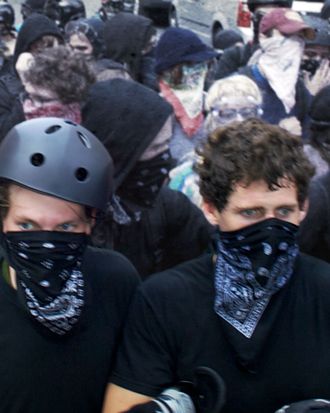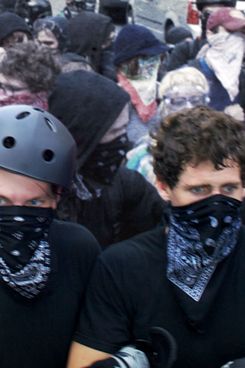

The mind-boggling documentary Better This World, showing tonight on PBSÔÇÖs POV with way too little fanfare, could be the foundation of an outlandish black comedy centering on a grandiose narcissist nutcase who becomes a left-wing social activist and then, when he doesnÔÇÖt rise high enough in the organization, decides to rat out his allies to the government while simultaneously egging them on to ever more violent acts of civil disobedience. Steven Soderbergh and Matt Damon will have to make that version, because Katie Galloway and Kelly DuaneÔÇÖs nonfiction account is eerily suggestive ÔÇö and alarming.
The protagonists are two young Midland, Texas, men, Bradley Crowder and David McKay, who were arrested in 2008 outside the Republican National Convention in Minneapolis. Over the previous year, theyd been participating in protests against the political party that brought us Shock and Awe, the occupation of Iraq, Bring em on, extraordinary rendition, enhanced interrogation, and a host of other criminal enterprises  but they hadnt thought of breaking laws themselves until an older activist named Brandon Darby began to pepper them with questions like, Dont you feel like firearms are necessary sometimes? (Their response was, Huh? No.) Darby fired them up, convinced them of the need to take their protest to the next level, helped them strategize, and then 
Well, you need to hear the story from Crowder and McKay, interviewed in jail (separately, of course, as theyÔÇÖre allowed no contact with each other) while awaiting trials that could send them to prison for 30 years. They are idealistic but nonideological young men, only politicized by the outrageous abuse of government power ÔÇö of the sort now being used on them.
I was lucky enough to see Better This World at last springÔÇÖs Sarasota Film Festival, where two other doc jurors and I gave it top prize in an extraordinary category. ItÔÇÖs an artful weave of interviews, found footage, heartrending tapes of phone calls from the prisoners to both sets of parents and McKayÔÇÖs girlfriend, and trial transcripts that might ÔÇö again ÔÇö have prompted gales of laughter in a different context. Prosecutors and U.S. Department of Justice agents speak on-camera, convinced that their vigilance has saved society from two dangerous anarchists. Darby does not appear, although ex-colleagues and an ex-girlfriend of his do, and heÔÇÖs seen in a video he made in New Orleans while helping with the post-flood cleanup. He says, ÔÇ£I want to better this world.ÔÇØ
Darby turns out to be a charismatic guy ÔÇö handsome, fluent, and logical in laying out what he sees wrong with American society and how it must be changed. If heÔÇÖd recruited me to his cause at age 21 at the height of the Bush-Cheney horrors, IÔÇÖd have drunk in his words, too, and maybe ended up in the same cell block as Crowder and McKay. Do prison newspapers have film critics? (ÔÇ£Four stars! An eye-opening documentary! I only wish IÔÇÖd seen it five years ago!ÔÇØ ÔÇöD.E., San Quentin Gazette)


